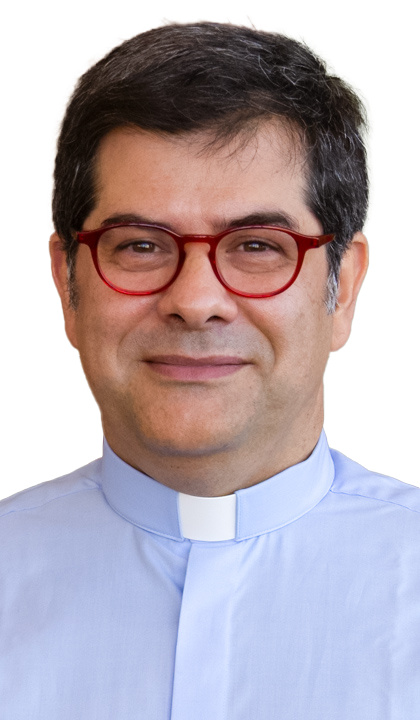Law Professor Participates in International War Crimes Conference
On March 4th, the prestigious London-based policy institute Chatham House held a virtual conference attended by many leading academic and diplomatic figures. The goal of the conference was to explore the creation of a special tribunal to prosecute war crimes committed by the Russian Federation in Ukraine. SLU Law professor Afonso Seixas-Nunes, S.J. was a part of the international initiative, along with the Ukrainian Minister of Foreign Affairs Dmytro Kuleba and the former Prime Minister of the U.K. Gordon Brown.
“The former Prime Minister of the U.K. and two very famous professors of international law, professor Philippe Sands and professor Dapo Akande, had this idea of creating a special tribunal as we did for the former Yugoslavia and for Rwanda,” said Seixas-Nunes. “It was in that context that we spoke with Foreign Minister of Ukraine, Dmytro Kuleba.”
Seixas-Nunes said parts of the conference felt like a “James Bond film,” due to the security measures taken by Foriegn Minister Kuleba.
“The foreign minister was in a car, and he would talk for 10 minutes and then change his location to avoid any possibility of being located by Russian forces.
“The impression I got is that I was in [a Bond] film, watching this going on. And the quality of the call sometimes of the video conference wasn’t great with him because he was using his mobile and he had to hang up like two or three times.”
Seixas-Nunes said he began the conference “very much in favor” of the creation of a special tribunal, but as the talk progressed, numerous legal and structural difficulties became apparent.
“At the beginning, I was very enthusiastic and excited, and now I have more doubts and questions than certainties,” said Seixas-Nunes.
Most war crimes tribunals are conducted by the International Criminal Court (ICC). In order to prosecute Putin and the Russian government, Russia has to be a state party to the ICC. “Even if everybody is keen to prosecute Mr. Putin and his establishment, you couldn’t because the Russian Federation is not a state party of the ICC standard,” said Seixas-Nunes.
The second possibility would be for the United Nations Security Council to refer the situation to the ICC. The ICC could then prosecute Putin. However, the Russian Federation is part of the U.N. Security Council and is one of five permanent members, and permanent members have the power to veto any resolutions.
Seixas-Nunes said a special tribunal could be created by states interested in prosecuting Mr. Putin outside of the ICC and United Nations in order to bypass these difficulties and prosecute Russian war crimes. However, Seixas-Nunes said that moving outside established international organizations presents a different set of challenges.
“To gather a group of enough states able to create the special tribunal is a big question mark,” said Seixas-Nunes. “Secondly, the money that this Court would require would run into the millions, and we don’t know how far the states would like to go to join this enterprise because the ICC already struggles with financial problems. Then, the third problem is evidence. How will this Court gather evidence when most of the evidence that we need is in Russia?”
Seixas-Nunes said the only way Russia could become collaborative and help with the evidence problem is if Putin is removed or deposed. However, the chance of regime change involving a new Russian leader willing to hold Putin accountable is slim.
“In that situation, if Russia wanted to prosecute, they could prosecute themselves. Russia could initiate a criminal case against Mr. Putin and his collaborators, or refer the situation to the ICC.”
Barring that extremely unlikely circumstance, the focus of the conference was creating a new court to prosecute Russian war crimes. The U.S. could potentially benefit from leading this effort, considering it is also not a state party to the ICC. However, the new tribunal structure would have to work around numerous other obstacles, namely Putin’s immunity as a head of state and the limited ability to combat Russian misinformation.
The conference also discussed the difficulty of bringing concrete charges against Russia in Ukraine in cases where the line between civilians and combatants has become blurred. For example, the Ukrainian government has posted instructional videos teaching civilians how to build Molotov cocktails and issued calls to join the Volunteer Corps; when these same civilians are caught or attacked by Russian forces, they lose their protection. In addition, Russia has claimed that various civilian structures they have attacked were used to house weaponry and soldiers, including hospitals and psychiatric wards. While these claims are unconfirmed, Seixas-Nunes said they make questioning the legitimacy of the attacks more difficult.
However, Seixas-Nunes said that there are some areas where war crimes appear to be clearly visible. When captured, numerous Russian soldiers have professed that they didn’t know why they were deployed nor their true objective, a violation of international law. Multiple signs of indiscriminate attacks have also emerged. An example is the recent bombing of the Maripol Drama Theater, where hundreds of refugees are feared dead.
“The reason to target a theater is very difficult from two angles,” said Seixas-Nunes. “First, it is a monument, and cultural properties are protected by the laws of war. Secondly, it was being used as a refuge for civilians. So it shouldn’t and it couldn’t be targeted.”
Seixas-Nunes says another conference is planned for Monday, March 28, where he hopes more progress will be made in discussions of creating a tribunal and prosecuting Russian war crimes.
Your donation will support the student journalists of Saint Louis University.




